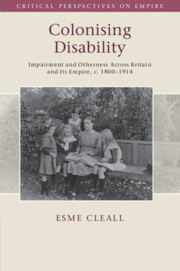
- Cited by 3
-
Cited byCrossref Citations
This Book has been cited by the following publications. This list is generated based on data provided by Crossref.
Hansen, Nancy and Tonge, Peter 2024. Horses, wheelchairs and place: on dehumanising disabled people. Scottish Geographical Journal, p. 1.
Nair, Aparna 2024. Enumerating Infirmity. Osiris, Vol. 39, Issue. , p. 75.
Bright, Rachel K Cleall, Esme and Kain, Jennifer S 2024. Reconsidering the history of eugenics and discrimination in migration control. Migration Studies, Vol. 13, Issue. 1,
- Publisher:
- Cambridge University Press
- Online publication date:
- July 2022
- Print publication year:
- 2022
- Online ISBN:
- 9781108983266
- Series:
- Critical Perspectives on Empire


